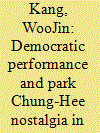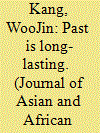| Srl | Item |
| 1 |
ID:
144303


|
|
|
|
|
| Summary/Abstract |
Why, a quarter century after democratization, are Korean citizens so nostalgic about the former authoritarian Park Chung-hee government? What are the implications of this support for Korea's democratic deepening? To answer these questions, I offer empirical analyses of selected data from the Korea Democracy Barometer 2010 survey that confirm the relevance of two dimensions of political support to authoritarian nostalgia in Korea: the life biography model and the economic performance model at the system level. The results suggest a double-sided phenomenon: on the one hand, nostalgia based on a retrospective collective memory; on the other, citizens' critical view of the performance deficits of post-Park democratic governments in dealing with inequality in Korean society. As the findings elucidate, in spite of the challenges they face, emergent democratic governments must perform more effectively if they are to win citizens' support.
|
|
|
|
|
|
|
|
|
|
|
|
|
|
|
|
| 2 |
ID:
080554


|
|
|
| 3 |
ID:
157777


|
|
|
|
|
| Summary/Abstract |
The main goal of this study is to examine the political influence of Park Chung Hee (PCH) nostalgia on citizens’ support for Park Guen-hye (PGH) in the 2012 Korean presidential election. The 2012 presidential election offers a rare opportunity to test the political influence of PCH nostalgia on citizens’ electoral choices. To do so, this study analyzes dual aspects of PCH nostalgia and its influence on voters choosing PGH in the 2012 presidential election: voter preference for PGH, and voter identification with developmentalism, the PCH government’s dominant ideology. The findings of this study confirm that both aspects of PCH nostalgia significantly influenced citizens who chose to support Park Chung Hee’s daughter. These findings also have comparative implications, relevant to similar political situations in other emergent democracies.
|
|
|
|
|
|
|
|
|
|
|
|
|
|
|
|